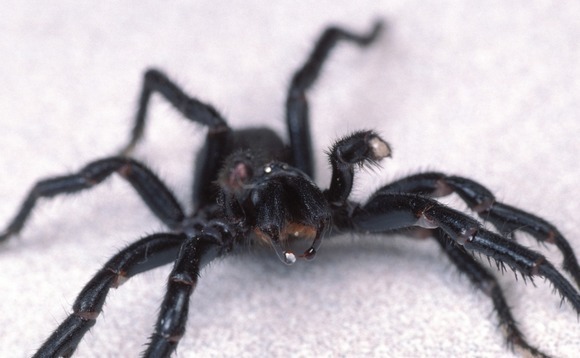
Australian start-up wins backing for spider venom drug

Infensa Bioscience, a newly established Brisbane-based drug developer, has raised AUD 23m (USD 15.6m) in funding to support the licensing of a nascent treatment that uses spider venom to mitigate heart attacks and strokes.
The capital came from a healthcare fund managed by Australian Unity, a local mutual organisation that provides a range of financial, homecare, and aged care services, and high net worth individuals (HNWIs).
The drug candidate, IB001, was developed by a research team at the University of Queensland. UniQuest, the university's commercialisation unit, has licensed it to Infensa with a view to pushing ahead with clinical trials. The name Infensa is inspired by the scientific name of the K'gari funnel-web spider, which provides the venom on which IB001 is based.
"The heart can't regenerate muscle cells that die during a heart attack, which is why these injuries cause permanent damage and can lead to heart failure, disability and reduced quality of life," said Mark Smythe, an associate professor at the university and CEO of Infensa, in a statement.
"IB001 blocks the signals that causes heart cells to die, and when given immediately to heart attack victims could reduce damage to the heart and significantly improve outcomes for people with heart disease, particularly in rural and remote regions."
IB001 is the lead compound in a series of proprietary inhibitors of ASIC1a, an ion channel found on brain nerve cells and heart muscle cells. ASIC1a is activated by acid produced when a stroke or heart attack interrupts blood supply to the brain and heart. Preventing this activation cuts off a communication chain that would otherwise instruct brain cells to commit suicide.
A molecule found in the venom of K'gari funnel-web spider, which is native to Fraser Island, a world heritage location off the coast of Queensland, is key to the blocking process.
In preclinical models of ischemic stroke, IB001 dramatically improved post-stroke performance even when administered eight hours after onset. Other preclinical modelling suggested that the drug would reduce damage to the heart after a heart attack and improve cardiac performance and also improve the viability of donor hearts used in transplantation.
Infensa claims that IB001 is 50,000 times more potent than the best existing small-molecule ASIC1a inhibitors and 60 times more potent than beta-blocker drugs.
"We knew the best modulators of ion channels were venoms," said Glenn King, a professor at the university's Institute for Molecular Bioscience, who made the initial research breakthrough with Nathan Palpant, an associate professor.
"My lab has the largest venom collection in the world, so we interrogated our collection, and found that the best molecule was in an Australian spider. We tested it in the context of stroke [on rodents] and found it was incredibly effective in stopping brain damage, even eight hours after a stroke."
Latest News
Asian GPs slow implementation of ESG policies - survey
Asia-based private equity firms are assigning more dedicated resources to environment, social, and governance (ESG) programmes, but policy changes have slowed in the past 12 months, in part due to concerns raised internally and by LPs, according to a...
Singapore fintech start-up LXA gets $10m seed round
New Enterprise Associates (NEA) has led a USD 10m seed round for Singapore’s LXA, a financial technology start-up launched by a former Asia senior executive at The Blackstone Group.
India's InCred announces $60m round, claims unicorn status
Indian non-bank lender InCred Financial Services said it has received INR 5bn (USD 60m) at a valuation of at least USD 1bn from unnamed investors including “a global private equity fund.”
Insight leads $50m round for Australia's Roller
Insight Partners has led a USD 50m round for Australia’s Roller, a venue management software provider specializing in family fun parks.







